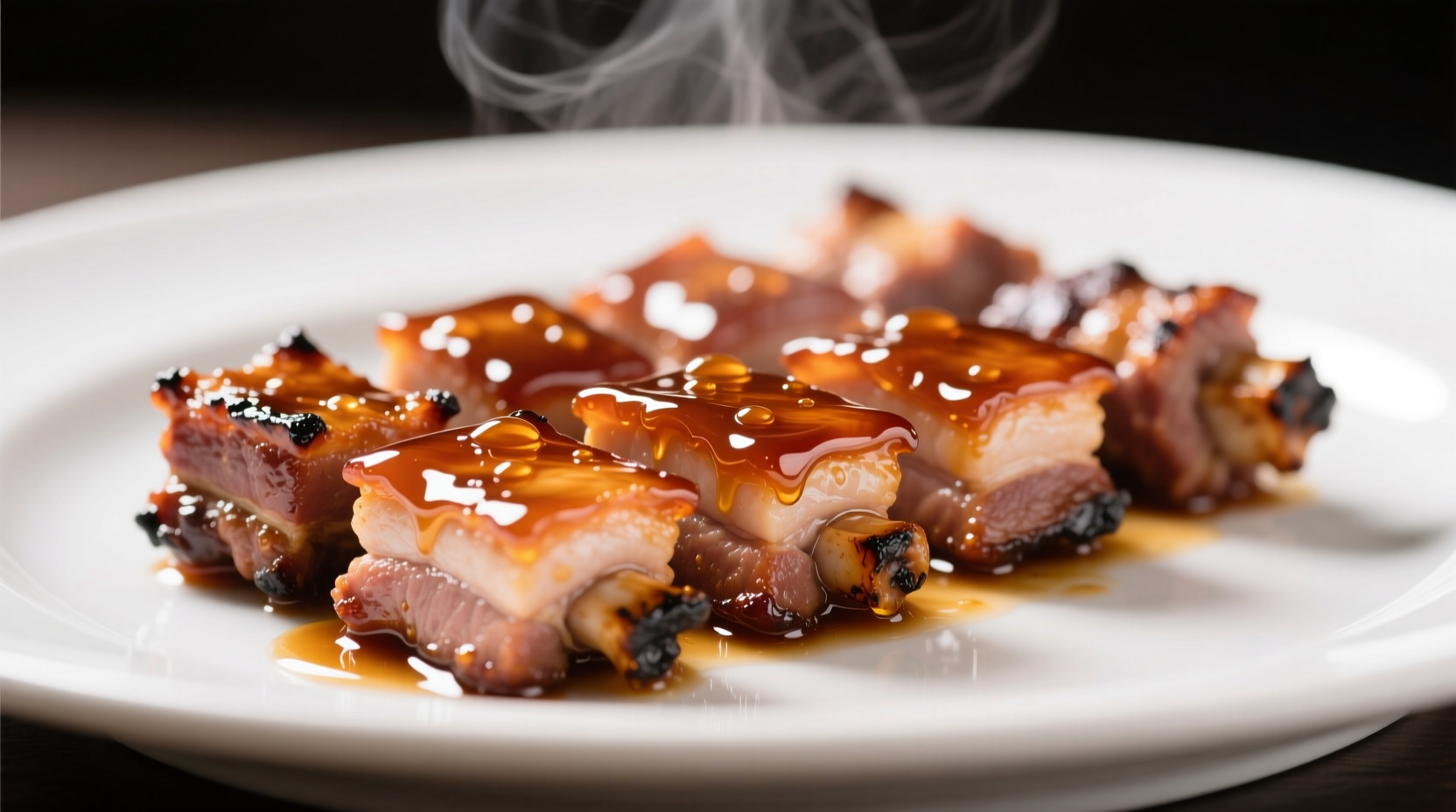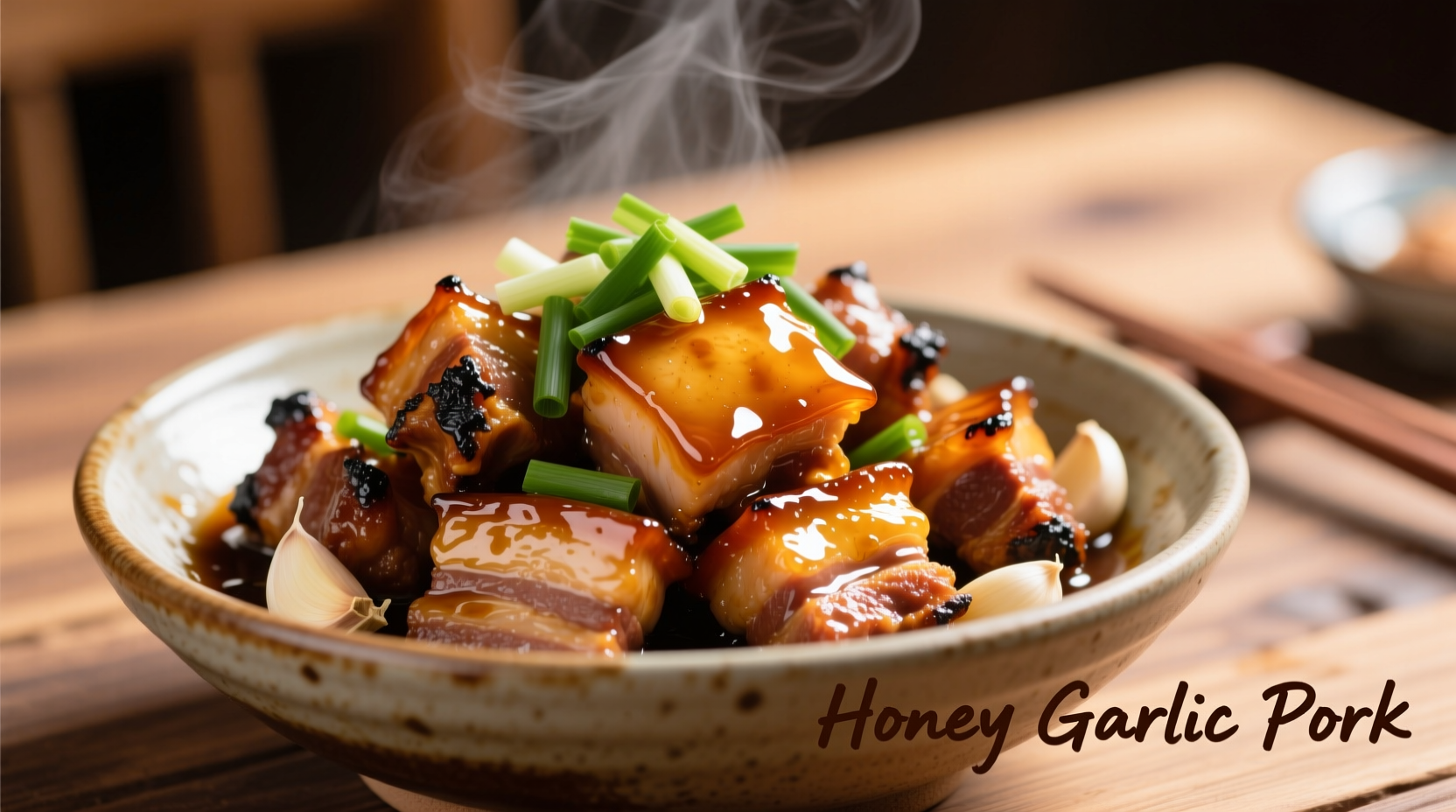Honey garlic pork has become a beloved staple in North American Chinese cuisine, but many home cooks struggle to recreate that perfect balance of sweet and savory with the ideal sticky-sauce texture. This comprehensive guide reveals the professional techniques that transform ordinary pork into an extraordinary dish that rivals your favorite restaurant's version.
The Secret Behind Perfect Honey Garlic Pork
Unlike traditional Chinese dishes, honey garlic pork emerged from Chinese-Canadian culinary innovation in the 1970s-1980s, blending Cantonese cooking techniques with Western flavor preferences. The magic happens through a precise balance of three elements: the caramelization of honey, the pungency of fresh garlic, and the tender texture of properly cooked pork.
| Key Development Period | Significant Changes | Regional Influence |
|---|---|---|
| 1970s | Initial creation in Toronto-area Chinese restaurants | Adaptation of sweet and sour pork using local ingredients |
| 1980s | Standardization of honey-garlic sauce ratio | Spread across Canadian Chinese restaurants |
| 1990s-2000s | Menu staple across North America | Influence on American Chinese cuisine |
| 2010s-Present | Home cooking adaptation with simplified techniques | Global popularity through food media |
This culinary timeline shows how honey garlic pork evolved from a regional specialty to a global favorite, adapting while maintaining its essential flavor profile. Understanding this history helps explain why certain techniques—like using fresh rather than powdered garlic—are crucial to authentic preparation.
Essential Ingredients for Authentic Flavor
The quality of your ingredients directly impacts the final dish. Here's what you need to know:
- Pork selection: Boneless pork shoulder (Boston butt) provides the ideal fat-to-lean ratio for tender results. Avoid lean cuts like tenderloin which dry out easily.
- Honey quality: Raw, unfiltered honey delivers superior floral notes compared to processed varieties. Local honey adds distinctive regional character.
- Garlic freshness: Fresh garlic cloves (never pre-minced) provide the complex flavor foundation. The Maillard reaction between fresh garlic and honey creates the signature aroma.
- Soy sauce selection: Use Chinese light soy sauce for proper saltiness without overpowering color.
Professional chefs consistently emphasize that ingredient quality matters most with simple recipes like honey garlic pork where each component shines through.

Step-by-Step Cooking Process
Follow these precise steps for restaurant-quality results every time:
Preparation Phase (15 minutes)
- Cut 1.5 lbs pork shoulder into 1.5-inch cubes, removing excess fat
- Marinate with 2 tbsp soy sauce, 1 tbsp rice wine, and 1 tsp cornstarch for 10 minutes
- Prepare sauce: 3 tbsp honey, 4 minced garlic cloves, 2 tbsp water, 1 tbsp rice vinegar, 1 tsp sesame oil
Cooking Technique (12 minutes)
- Heat 2 tbsp oil in wok over high heat until shimmering
- Sear pork in single layer without crowding (work in batches)
- Cook until golden brown (2-3 minutes per side), then remove
- Add sauce to wok, simmer 1 minute until fragrant
- Return pork to wok, toss to coat for 2-3 minutes until glossy
- Finish with sliced green onions
The critical temperature window for perfect honey garlic pork is 165-170°F internal temperature. Cooking beyond this range causes the proteins to tighten and squeeze out moisture, resulting in tough meat. Use an instant-read thermometer for precision.
Pro Tips for Consistent Success
Professional chefs employ these techniques to elevate their honey garlic pork:
- Sauce consistency control: If sauce becomes too thick, add 1 tsp water at a time. If too thin, simmer 30 seconds longer.
- Garlic timing: Add half the garlic during sauce preparation, the other half in the last minute of cooking for layered flavor.
- Browning secret: Pat pork cubes completely dry before searing for optimal caramelization.
- Resting period: Let cooked pork rest 3 minutes before serving to allow juices to redistribute.
| Cooking Stage | Visual Cue | Texture Indicator |
|---|---|---|
| Searing pork | Deep golden brown crust | Slight resistance when pressed |
| Sauce reduction | Coats back of spoon | Leaves trail when finger drawn through |
| Finished dish | Glossy, sticky appearance | Tender with slight spring back |
When Honey Garlic Pork Works Best (and When It Doesn't)
This versatile dish shines in specific contexts but has limitations:
- Ideal for: Weeknight family dinners, entertaining guests, meal prep (holds well for 3 days), pairing with steamed rice and simple vegetables
- Less suitable for: Strict low-sugar diets, formal occasions requiring elegant plating, hot summer months when heavy dishes feel overwhelming
- Special considerations: Not appropriate for honey allergies or raw honey concerns for infants. Diabetics should reduce honey by 25-50% and compensate with additional rice vinegar.
Understanding these context boundaries helps you determine when honey garlic pork will satisfy your specific dining needs rather than forcing the dish into inappropriate situations.
Nutritional Profile and Health Considerations
A standard 4-ounce serving of honey garlic pork provides:
| Nutrient | Amount | % Daily Value |
|---|---|---|
| Calories | 320 | 16% |
| Protein | 24g | 48% |
| Total Fat | 14g | 18% |
| Saturated Fat | 4g | 20% |
| Carbohydrates | 22g | 8% |
| Sugars | 18g | * |
*No official %DV for sugars. Values based on USDA FoodData Central database (accessed 2023-10-15). Source: https://fdc.nal.usda.gov/
The primary nutritional consideration with honey garlic pork is its sugar content from honey. While honey offers some antioxidant benefits compared to refined sugar, portion control remains important for those monitoring sugar intake. The dish provides substantial protein and contains no artificial ingredients when prepared traditionally.
Serving Suggestions for Maximum Enjoyment
Complete your honey garlic pork meal with these professional pairing recommendations:
- Perfect pairings: Steamed jasmine rice, stir-fried bok choy, and cucumber salad create a balanced meal
- Wine pairing: Off-dry Riesling or Gewürztraminer cuts through the sweetness
- Leftover transformation: Chop leftovers and use as filling for spring rolls or fried rice
- Meal prep tip: Store sauce and pork separately, combining only when reheating for best texture
For special occasions, present honey garlic pork over a bed of forbidden black rice with roasted broccoli florets for an elegant upgrade that maintains the dish's essential character.
Troubleshooting Common Problems
Even experienced cooks encounter these honey garlic pork challenges:
- Burnt garlic: Garlic burns at 325°F—keep heat at medium when adding garlic to sauce
- Watery sauce: Simmer longer to reduce or add 1/2 tsp cornstarch slurry
- Dry pork: Overcooking is the culprit—use thermometer and remove at 165°F
- Too sweet: Balance with additional rice vinegar (1 tsp at a time)
Remember that honey's viscosity changes dramatically with temperature—what seems too thin when hot will thicken considerably as it cools. Always judge sauce consistency when the dish is nearly finished cooking.











 浙公网安备
33010002000092号
浙公网安备
33010002000092号 浙B2-20120091-4
浙B2-20120091-4